Why Thermal Therapy Is So Hot Right Now
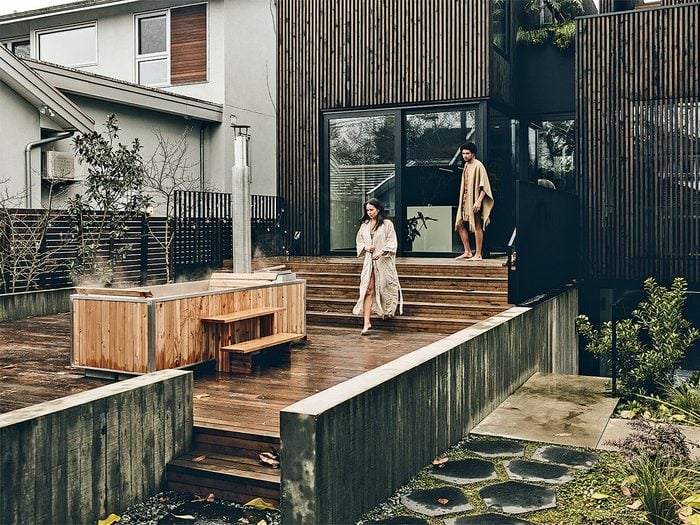
More and more Canadians are adding saunas and hot tubs to their quarters. Here are the health benefits of thermal therapy, and everything else you need to know.
Our hot tub was by far our best pandemic purchase. If we couldn’t lounge on a beach, or even drive to a nearby hot springs resort, why not turn our Kelowna, B.C. residence into a vacation home?
In June 2020 we spent our family travel fund on a Costco hot tub. When it arrived two months later, my husband and I unpacked the five-person tub, heaved it onto the deck right outside our bedroom, filled it up and plugged it in. (This is what’s called a “plug and play,” which works in a regular 110-volt outdoor outlet.) Thermal therapy in the form of happy-hour sessions and post-workout soaks soon became part of our life.
The Rise of Thermal Therapy
We’re not the only Canadians who took the plunge into thermal therapy during COVID-19 restrictions and lockdowns. My friend Andrea and her husband waited nearly a year for their swim spa (an oversized hot tub that converts to a pool in summer), which had to be lifted into their Kelowna backyard with a crane. “Everyone was getting on this bandwagon,” says Andrea. She planned to use it for relaxation and exercise—it has a resistance feature that allows you to swim in place, against the current—and as a way to keep her daughters busy in the summer.
Vern Nelson, the Kelowna sales manager for Arctic Spas, a Canadian luxury hot tub company, says his store saw a 40 percent increase in hot tub sales. It would have been greater if there had been more stock. The surge in demand for home spas put stress on the entire industry, which struggled with staffing and supply issues, says Nelson. Some people turned to rental companies—which can deliver and install a hot tub for a few days—to mark special occasions when everything else was closed.
“It was a good option to spend time together safely, bubbled up,” says Nelson. AlumiTubs, a smaller manufacturer located on B.C.’s Sunshine Coast, recorded a six-fold increase in sales of their wood-fired cedar hot tubs. “There was a shift in people’s desire to seek simple pleasures—from time spent at home, or doing renovations to finding unique products like ours,” says AlumiTubs co-owner Laura Anderson. Sales haven’t slowed since, despite a ten-month lead time. “People are willing to wait,” she says.
Last winter, IKEA launched a super-buzzy sauna line in collaboration with Marimekko, the iconic Finnish design brand. The BASTUA collection included robes, bench towels and a sauna bucket and ladle—main-streaming the idea that we should all be pampering ourselves at home.
Thermal Therapy Around the World
By 2028, the global spa market size will reach nearly $118 billion (USD), with destination spas—a more practical option for those who don’t have the space or budget for an at-home tub—forecast to experience the fastest growth. Multiple Nordic-style spas have popped up across Canada in the past few years, with hot pools, saunas, steam rooms, cold plunge pools and solariums for relaxation. From Eclipse Nordic Hot Springs in the Yukon to Mysa Nordic Spa & Resort in P.E.I, thermal therapy might be more accessible than you think.
Of course, Nordic people have, for centuries, sworn by the benefits of soaking and steaming. In Iceland, public hot springs and pools are commonplace. Meanwhile, in Finland, many families have access to a sauna. The thermal therapy trend also spans the globe to the banya steam baths of Russia, the onsen of Japan, and the jjimjilbang bathhouses of South Korea. Parts of Canada are already blessed with natural hot springs. A particularly famous one—Banff—was the impetus for our first national park. Really, it’s little wonder we’re bringing hydrotherapy and thermotherapy home and reaping the health rewards in the process.
The Health Benefits of Thermal Therapy
Alison Hoens, a clinical professor in the UBC Department of Physical Therapy, says those positive side effects are both physical and mental. However, they’re largely temporary. Immersing yourself in hot water can reduce stiff muscles and joints, improve muscle flexibility and increase blood flow.
Saunas provide similar results. However, there isn’t enough research to confirm that schvitzing in a sauna helps rid your body of toxins or improves your complexion, says Hoens. “[In a sauna] your body is sweating in response to being stressed. It’s about heat exchange. The body is just trying to cool itself.”
The physical gains of hot-tub time and thermal therapy come with mental health perks including stress relief and social connection. I can vouch for the attitude adjustment achieved during a soak with friends after a day of skiing, for example.
Using Hot Tubs and Saunas Safely
But in order to enjoy hot tubs and saunas safely, users need to manage a few risks, says Michael Schwandt, a clinical assistant professor in the UBC Faculty of Medicine’s School of Population and Public Health.
The main concern is keeping spa water sanitized to prevent the growth of harmful bacteria such as legionella or pseudomonas, which can grow in warmer water temps, or the spread of viruses that cause gastrointestinal illnesses (like norovirus). Tracking the pH is also important to prevent skin irritation, and showering after use is a good idea regardless.
“We recommend water testing frequently—almost daily—when the tub is in use,” says Schwandt.
Excessive heat or staying in a hot tub or sauna too long can also be problematic, especially for pregnant women or those with cardiovascular health problems, says Schwandt. Use by children should always be monitored by an adult due to risk of drowning and overheating.
Schwandt also recommends not drinking alcohol before or during hot tub use. If you do, it’s a good idea to imbibe in moderation and with others present, he says. Be sure to also make sure to hydrate with water. You may not realize you’re sweating while in the hot tub and will get dehydrated faster.
Are Hot Tubs Worth It?
Cleaning our hot tub has been a cinch. We change out the water every couple months and stay on top of the chemicals through regular testing. And because it holds a lot less water than a swimming pool, it’s much easier to maintain.
The biggest hurdle for investing in thermal therapy at home is the cost. Our Costco tub was on sale and it still put us back about $4,000. There’s a space-saving inflatable Coleman model from Canadian Tire that’s around $1,000. But it’s possible to spend a whole lot more. My friend Andrea shelled out over $30,000 on her hot tub/resistance pool model, not counting the additional costs of a concrete pad and an electrical upgrade.
Basically, you have to decide if the lifestyle boost is worth the initial cost, plus the ongoing maintenance. “We definitely don’t use it as much as I thought we would,” my friend says, but ultimately, she’s glad they invested. “We don’t do a lot of vacations, so if we can make our backyard into an oasis we want to hang out in, why not try?”
Four Canadian Hot Tub and Sauna Companies
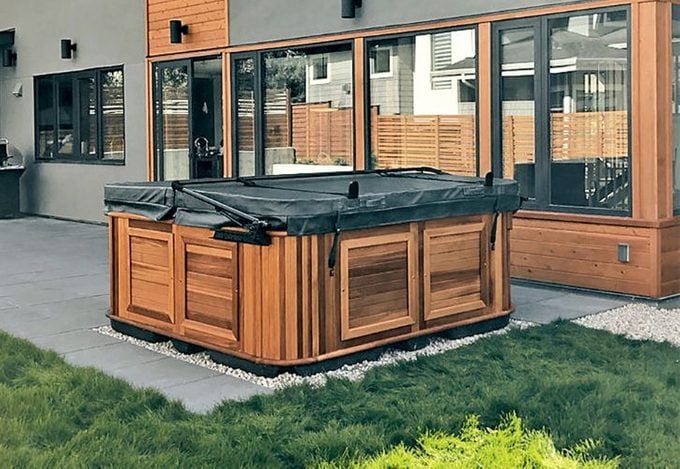
Arctic Spas
The Custom Series Summit is the most popular hot tub from Arctic Spas, an Alberta-based company with locations across Canada. Ideal for families, this model seats six and has different depth seats for everyone in the family. There are even armrests and a swivel/lounge seat that offers various seating angles and leg positions for maximum comfort.
Starting from $15,000-$25,000, arcticspas.com
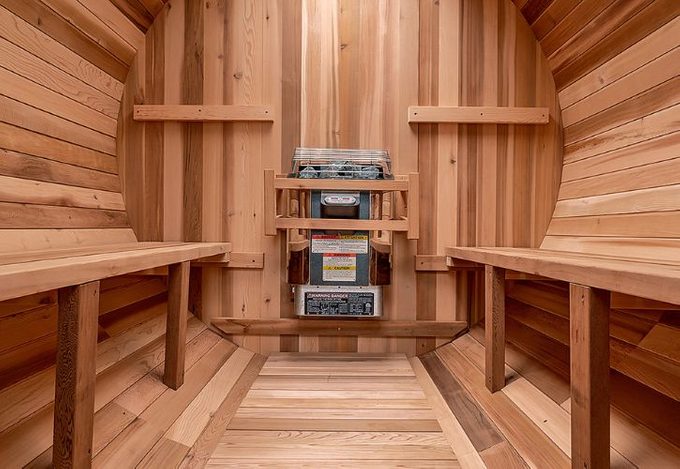
Backcountry Recreation
Turn your backyard into an après ski haven with your own cedar barrel sauna. This gorgeous, six-foot tube of relaxation accommodates four to six people. It’s made by a Vancouver Island company from fragrant western red cedar and can be powered with either wood or electricity. The self-assembly kit takes about three or four hours to build.
$7,700 plus shipping; backcountryrecreation.com
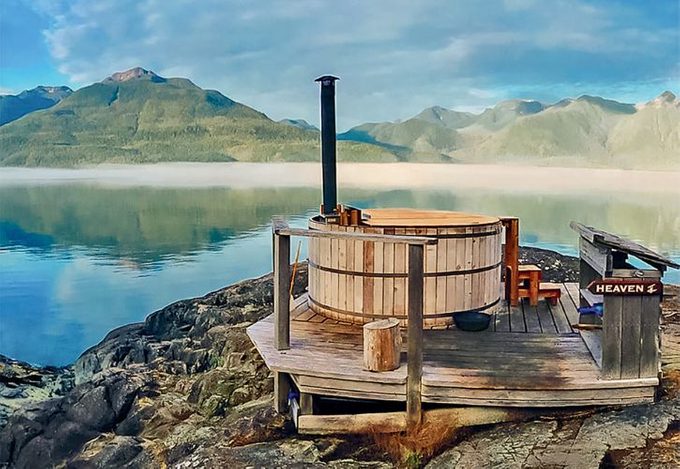
AlumiTubs
This family-owned B.C. business uses all local, recyclable materials and builds their cedar tubs in Sechelt, on the Sunshine Coast. With a wood-fired tub, it takes two to four hours to heat up. Plus, temperature can be maintained with an additional armload of wood per day. The meditative work of chopping wood ahead of time to heat the tub is part of the appeal. This kind of hot tub can work off-grid at remote cabins, as well.
$7,495 for a two-person tub; alumitubs.com
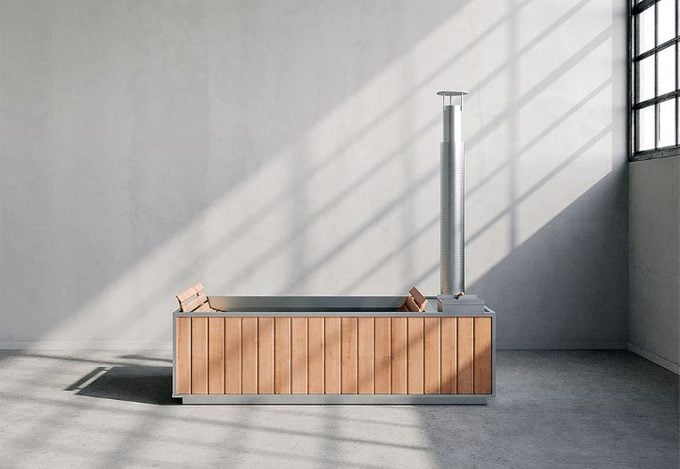
Goodland
Crafted by a company based on B.C.’s Bowen Island, these hot tubs were initially created in 2021 as a side project by a local firefighter. Since then, these rectangular, wood-burning hot tubs have taken off. Goodland has been featured in Dwell, Goop, Elle Decor and on many influencer social media accounts. It’s made of western red cedar, oak, brass and marine-grade aluminum. Plus, its comfortably seats four people.
$7,995, hellogoodland.com




